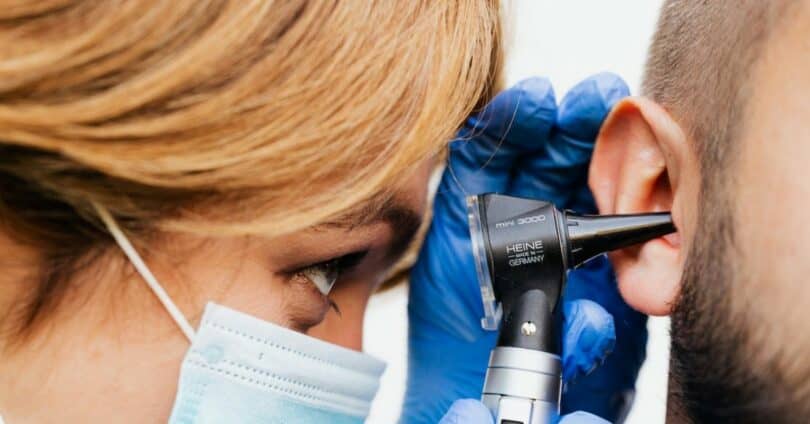Do you struggle to hear conversations in a busy room? Or does music always sound like it’s underwater no matter how loud you turn up the volume? If so, then it might be time for you to get your hearing checked out. As we age, our sense of hearing diminishes imperceptibly over time but often creates bigger problems that can worsen without help or treatment.
Knowing when and why to get your ears examined is important in making sure these issues don’t drastically affect your life as well as maintaining healthy listening habits. This blog post will provide essential information on how to know it’s time to get your hearing tested and offer tips on what steps you should take next.
You struggle to hear conversations in a busy room
While it is normal for some individuals to experience difficulty following conversations in a busy or noisy environment, persistent problems with hearing in these settings could indicate a hearing impairment. Background noise in crowded spaces can make it hard for the brain to distinguish between important auditory stimuli and extraneous sounds. People struggling to understand conversations in noisy environments may need to focus more intently on lip-reading or facial expressions to supplement their hearing. Visiting a hearing specialist or audiologist, as well as learning more at www.hear.com, or another online resource can help diagnose any hearing-related problems and determine the appropriate treatment options. Most importantly, because conversations hold an important role in socializing, it is vital to seek help when you feel your ability to take part in conversations has been diminished.
Music sounds like it’s underwater no matter the volume setting
The phenomenon of music sounding like it’s underwater has fascinated scientists and medical professionals alike. Despite adjusting the volume setting, this peculiar effect can still occur. The likely explanation lies in the way our ears perceive sound waves. When sound waves travel through water, they are refracted and the sound quality is altered. Similarly, when sound waves travel through the fluid-filled inner ear, they are subject to the same distortion. This suggests that the issue is not with the music itself, but with the way our ears process it. Further investigation into the mechanics of hearing may be necessary to fully understand this intriguing phenomenon.
You need to turn up the volume on your television or radio significantly higher than usual
This medical condition is often the result of exposing your ears to loud sounds frequently or over a prolonged period, leading to damage to your auditory system. Hearing loss can significantly impact your social life and overall well-being. As such, seeking medical attention and appropriate treatment is crucial to prevent further hearing damage or loss. In a lot of instances, this particular symptom can be helped by using a hearing aid, which amplifies sound and allows you to adjust the volume as necessary. However, a lot of people are unaware of the potential benefits of hearing aids, which is why consulting with a professional audiologist is essential in order to determine the best course of action.
You’ve noticed that you don’t hear as well as you used to in certain situations
This could include struggling to hear conversations in noisy environments or missing important dialogue during movies or TV shows. It’s important to address any changes in your hearing to ensure you’re not missing out on key information or potentially putting yourself in danger by not hearing warning signals. Consulting with a medical professional or audiologist can provide insight into potential causes and solutions for your hearing loss. Remember, taking care of your hearing is a vital part of overall health and well-being.
People around you complain about how loud your TV or music is set
The World Health Organization (WHO) lists noise pollution as the second-biggest environmental threat to public health after air pollution. Constant exposure to loud noises can lead to fatigue, headaches, and even hearing loss over time. Furthermore, studies have shown that exposure to noise pollution can increase stress levels and contribute to the development of cardiovascular diseases. It is important to be mindful of the noise levels in our environment and take necessary steps to reduce them for the sake of our health and well-being.
Your ears feel plugged, muffled, or stuffy when noises become too loud
This sensation is known as noise-induced hearing loss, a condition that affects millions of people around the world. When we are exposed to loud noises for prolonged periods, our ears become fatigued and may not function properly. This can result in a range of symptoms, including a feeling of fullness or pressure in the ears, difficulty hearing, and even tinnitus. If you experience any of these symptoms, it is important to seek medical attention to prevent further damage to your hearing. Understanding the impact of loud noise on our ears can help us take steps to protect our hearing and preserve our ability to hear the world around us.
It’s important to make your hearing health a priority and get it checked out if you believe you are experiencing issues. Hearing irregularities can easily go undiagnosed for long periods of time, leading to feelings of frustration and isolation. Learn more about the warning signs and don’t be afraid to take control of your hearing health. Taking steps to diagnose a potential problem can help you stay active in conversations with friends, family, colleagues, or classmates which is an essential part of living life fully and feeling connected. If you or someone you know has been dealing with any of the issues outlined above, we recommend getting a comprehensive hearing test done. You may also consider a consultation with a reliable audiologist or specialist as they can provide personalized treatment options and proper counseling on managing your lifestyle and hearing loss journey.









